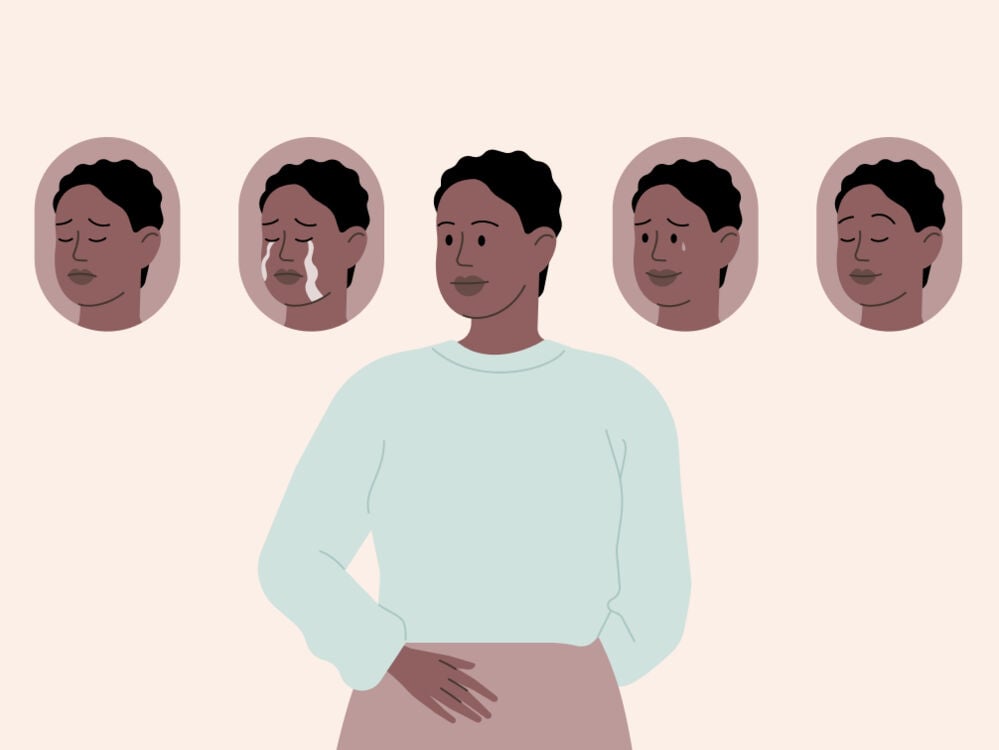Lots of us experience perimenopause mood swings. Here, we ask a Flo expert why they happen and how to manage them.
-
Tracking cycle
-
Getting pregnant
-
Pregnancy
-
Help Center
-
Flo for Partners
-
Anonymous Mode
-
Flo app reviews
-
Flo Premium New
-
Secret Chats New
-
Symptom Checker New
-
Your cycle
-
Health 360°
-
Getting pregnant
-
Pregnancy
-
Being a mom
-
LGBTQ+
-
Quizzes
-
Ovulation calculator
-
hCG calculator
-
Pregnancy test calculator
-
Menstrual cycle calculator
-
Period calculator
-
Implantation calculator
-
Pregnancy weeks to months calculator
-
Pregnancy due date calculator
-
IVF and FET due date calculator
-
Due date calculator by ultrasound
-
Medical Affairs
-
Science & Research
-
Pass It On Project New
-
Privacy Portal
-
Press Center
-
Flo Accuracy
-
Careers
-
Contact Us
Perimenopause mood swings: Why they happen and how to deal


Every piece of content at Flo Health adheres to the highest editorial standards for language, style, and medical accuracy. To learn what we do to deliver the best health and lifestyle insights to you, check out our content review principles.
Tearful, cranky, or feeling frustrated, but your period isn’t due anytime soon? Life can be tough, and we all feel overwhelmed at times. But if you’ve been finding it difficult to regulate your emotions lately, you might be experiencing a common symptom of perimenopause: mood swings. This is likely due to changes in the hormones estrogen and progesterone, which can cause other telltale perimenopause symptoms such as hot flashes, brain fog, and fatigue.
Heard of menopause but not perimenopause? The terms are often used interchangeably, but they’re actually two separate life stages.
Put simply, perimenopause refers to the years leading up to menopause (your final period). It usually begins somewhere between your late 30s and 50s, but most often in your 40s.
You’re then diagnosed as having gone through menopause when you haven’t had a period for 12 months (usually between the ages of 45 and 55). From then on, you are postmenopausal.
Of course, you might be experiencing changes in your mood due to reasons other than perimenopause, such as premenstrual syndrome (PMS), stress, or even high or low blood sugar. This article will focus on mood swings during perimenopause, but if you have any questions or concerns about your mood, always reach out to your health care provider.
Key takeaways
- 4 in 10 women experience perimenopause mood swings.
- Mood swings during perimenopause are often related to hormonal changes.
- Healthy lifestyle changes and hormone therapy (HT, also known as hormone replacement therapy or HRT) may help to relieve perimenopausal symptoms related to mood swings.
Perimenopause mood swings: How are they connected?
Remember puberty? (We know — some of us would prefer not to as well!) Thanks to the shifting estrogen and progesterone levels that signaled the start of your menstrual cycle, your teenage years may have been an emotionally turbulent time. Following puberty, the hormonal changes during your menstrual cycle might have caused you to experience mood swings just before your period, as a symptom of PMS.
Then fast-forward to perimenopause, and you’re in the natural transition toward the end of your reproductive years, which comes with its own share of hormone-related upheaval.
So, what’s happening inside your body? In a nutshell, your hormone production begins to change during perimenopause. In particular, the levels of estrogen produced by your ovaries start to vary more than before, fluctuating to high and low levels. It’s this erratic estrogen production that can cause those telltale perimenopause symptoms, including mood swings.
Take a quiz
Find out what you can do with our Health Assistant
How common are they?
Pretty common. “About 4 in 10 women have mood symptoms during perimenopause that are similar to PMS,” explains Dr. Nazaneen Homaifar, obstetrician and gynecologist, Inova Health System, Washington, DC, US. “Unlike PMS, where the symptoms are related to the menstrual cycle, mood swings in perimenopause may occur without a pattern.”
If you’re experiencing mood swings, it can help to share what you’re going through. Talking to friends can make a big difference, especially if they’re around the same age. You might find that they’re experiencing similar symptoms to you, and you can support each other by meeting up for a chat or messaging.
Lean on your other loved ones where possible, too. Lots of us are juggling different life stresses — like caring for aging parents, working at demanding jobs, or parenting teens — alongside perimenopause, so suggest practical ways they can support you. Maybe it’s taking on their fair share of chores at home or figuring out where they can help free up your time so you can do something you enjoy.
Finally, it can help to book an appointment with your health care provider. They’ll be able to provide advice, put together a personalized treatment plan, and direct you to support services, should you need them. They could also help you to manage any other symptoms you might be experiencing, too.

When to see your doctor and what to say
Perimenopause might be a natural life stage, but you don’t need to put up with the symptoms if they’re impacting your life. Dr. Homaifar has this advice: “Talk to your doctor if you find that your mood swings are affecting your quality of life and making it difficult to function.”
As for what to say, it might help to prepare for your appointment by keeping a diary of your moods, along with any other potential perimenopause symptoms you’re living with. You might also want to ask your doctor questions including whether you’ll need any tests, what treatment options are available, and what else you can do to help reduce your symptoms.
Once you have all the information at hand, you can then make an informed decision about the right treatment plan for you.
What perimenopause mood swings can feel like
You might experience a whole spectrum of emotions, and any one of these feelings can arrive completely out of the blue:
- Low mood
- Anxiety
- Low self-esteem or self-confidence
- Problems with memory or concentration (brain fog)
But what’s the reality of actually living with them? “Mood swings were the first telltale sign that I was perimenopausal, even before my periods changed,” Ella*, 48, from Bristol, UK, tells Flo. “I started to notice that little things my husband and kids said or did just grated more, similar to PMS, but for no reason.”
Hormone therapy helped Ella to manage her mood swings. “As soon as I was on [it], I felt calmer again,” she says. “But I still feel like my emotions are closer to the surface than before — and I have less of a filter these days.”
Why do perimenopause mood swings happen?
As with many symptoms of perimenopause, more research is needed to figure out exactly what’s going on. However, experts think the following could be to blame:
Hormonal changes
The most common theory is that mood swings are hormone related.
“Mood swings or disorders in perimenopause are related to fluctuating and declining hormones,” explains Dr. Homaifar. “Estrogen promotes activity in the hippocampus (the area of the brain associated with learning and memory formation) and also supports the activity of brain chemicals like serotonin, which is responsible for mood stabilization. With the fluctuation or decline of estrogen, these functions can suffer.”
That’s why your doctor might prescribe HT, which contains synthetic versions of estrogen and progesterone (or just estrogen on its own if you’ve previously had a hysterectomy). This can help to stop those hormonal highs and lows.
Vasomotor symptoms
Vasomotor symptoms (VMS), such as hot flashes and night sweats, are episodes of intense heat that usually occur around the head, neck, chest, and upper back. They are also common during perimenopause. In fact, more than 80% of women experience them. And perhaps unsurprisingly, research has found a direct link between VMS and mood and sleep disturbances.
Let’s face it: Sleep is closely connected to your mental and emotional health, so it makes sense that even a short period of disturbed nights can make it tricky to regulate your mood. Finding ways to manage VMS, particularly night sweats (such as keeping cool, avoiding too much caffeine and alcohol, and quitting smoking) could, in turn, help you to feel more in control of your emotions.
Preexisting medical conditions
Mood swings can be difficult to live with, but they shouldn’t be confused with depression. Depression is a mental health condition characterized by feeling persistently low for long periods of time, and it can get worse without treatment.
That said, women are at an increased risk of developing depression during perimenopause. “Mood disorders are more common during the perimenopausal years compared to the pre- or postmenopausal years,” says Dr. Homaifar.
Contact your health care provider if you think you may be living with depression. They’ll be able to provide support and advice, along with treatments such as talking therapy and medication should you need them.
What helps with mood swings?
Feeling like your emotions are out of control is not an easy thing for anyone to deal with. The good news is that there are things you can do to help stabilize your mood and feel more like yourself again. These include:
Taking HT or the contraceptive pill
HT is the most common treatment for perimenopause and menopause symptoms. Available in lots of different forms (think pills, patches, and creams), HT contains versions of the hormones estrogen and progesterone, or just estrogen if you don’t have a uterus, to stop the hormonal highs and lows. Your health care provider can prescribe HT, depending on your medical history and current situation. It’s a good idea to ensure that any HT treatment prescribed is government approved, meaning it has been studied and verified by experts.
If you’re already using hormonal birth control pills, then you can continue to take them during perimenopause, or you can be prescribed them if you’re avoiding pregnancy (yep, it’s true that you can still get pregnant during perimenopause). These pills work in a similar way to HT by stabilizing your fluctuating hormone levels, which in turn should help to decrease perimenopause symptoms. Just remember to consult your doctor before taking any form of hormonal birth control, to ensure it’s safe for you to use.
Taking antidepressants
Certain antidepressants are another option to treat mood swings if you can’t take estrogen or if you have a mood disorder.
If you have any questions or concerns about taking them or you want to know if they could be right for you, be sure to ask your health care provider for advice.
Make some small lifestyle tweaks
Try talking therapy. Cognitive behavioral therapy has been found to ease stress, low mood, and sleep problems in women with perimenopausal symptoms such as mood swings.
Focus on your mental well-being. Dr. Homaifar says treatments known to benefit mental health in general could help to lift your mood. “Mindfulness and meditation, exercising, limiting caffeine or sugar, and quitting tobacco products can all help,” she says.
Manage your weight (if you want to). Research has found that women who are overweight tend to have more frequent and severe hot flashes than those who are not, so managing your weight could be beneficial. And given the known link between VMS and low mood, weight loss might also give your mind a boost, too.
*Name has been changed.
More FAQs
How long do perimenopause mood swings last?
It’s difficult to gauge exactly how long perimenopause mood swings last. Some women experience mood swings for years with no pattern. But a survey of women aged 50 to 64 found that 65% were happier postmenopause. In fact, most women reported an improvement in all aspects of life postmenopause.
Will I be calmer after menopause?
While there is no specific evidence related to feeling calmer after menopause, one promising study found that negative mood scores dropped significantly when women reached 65.


Hey, I'm Anique
I started using Flo app to track my period and ovulation because we wanted to have a baby.


The Flo app helped me learn about my body and spot ovulation signs during our conception journey.


I vividly
remember the day
that we switched
Flo into
Pregnancy Mode — it was
such a special
moment.
Real stories, real results
Learn how the Flo app became an amazing cheerleader for us on our conception journey.
References
Augoulea, Areti, et al. “Psychosomatic and Vasomotor Symptom Changes during Transition to Menopause.” Przeglad Menopauzalny [Menopause Review], vol. 18, no. 2, June 2019, pp. 110–15, www.ncbi.nlm.nih.gov/pmc/articles/PMC6719639/.
Bansal, Ramandeep, and Neelam Aggarwal. “Menopausal Hot Flashes: A Concise Review.” Journal of Mid-Life Health, vol. 10, no. 1, Jan.–Mar. 2019, pp. 6–13, journals.lww.com/jomh/fulltext/2019/10010/menopausal_hot_flashes__a_concise_review.3.aspx.
Campbell, Katherine E., et al. “The Trajectory of Negative Mood and Depressive Symptoms over Two Decades.” Maturitas, vol. 95, Jan. 2017, pp. 36–41, www.maturitas.org/article/S0378-5122(16)30284-5/fulltext.
Casper, Robert F. “Patient Education: Menopause (Beyond the Basics).” UpToDate, 15 Nov. 2022, www.uptodate.com/contents/menopause-beyond-the-basics.
Cho, Moon Kyoung. “Use of Combined Oral Contraceptives in Perimenopausal Women.” Chonnam Medical Journal, vol. 54, no. 3, Sep. 2018, pp. 153–58, www.ncbi.nlm.nih.gov/pmc/articles/PMC6165915/.
“Dealing with Stress.” Every Mind Matters, www.nhs.uk/every-mind-matters/mental-health-issues/stress/. Accessed 2 Nov. 2023.
Fox, Kate. “Jubilee Women.” Social Issues Research Centre, 8 May 2002, www.sirc.org/publik/jubilee_women.shtml.
Freeman, Ellen W., et al. “Associations of Hormones and Menopausal Status with Depressed Mood in Women with No History of Depression.” Archives of General Psychiatry, vol. 63, no. 4, Apr. 2006, pp. 375–82, pubmed.ncbi.nlm.nih.gov/16585466/.
Herson, Megan, and Jayashri Kulkarni. “Hormonal Agents for the Treatment of Depression Associated with the Menopause.” Drugs & Aging, vol. 39, no. 8, Aug. 2022, pp. 607–18, www.ncbi.nlm.nih.gov/pmc/articles/PMC9355926/.
“Hormone Therapy: Is It Right for You?” Mayo Clinic, 6 Dec. 2022, www.mayoclinic.org/diseases-conditions/menopause/in-depth/hormone-therapy/art-20046372.
Hunter, M. S. “Cognitive Behavioral Therapy for Menopausal Symptoms.” Climacteric: The Journal of the International Menopause Society, vol. 24, no. 1, Feb. 2021, pp. 51–56, pubmed.ncbi.nlm.nih.gov/32627593/.
“Menopause.” Mayo Clinic, 25 May 2023, www.mayoclinic.org/diseases-conditions/menopause/symptoms-causes/syc-20353397.
“Menopause.” World Health Organization, 17 Oct. 2022, www.who.int/news-room/fact-sheets/detail/menopause.
“Menopause 101: A Primer for the Perimenopausal.” The North American Menopause Society, www.menopause.org/for-women/menopauseflashes/menopause-symptoms-and-treatments/menopause-101-a-primer-for-the-perimenopausal. Accessed 2 Nov. 2023.
“Mood Disorders.” Cleveland Clinic, my.clevelandclinic.org/health/diseases/17843-mood-disorders. Accessed 2 Nov. 2023.
“Overview: Depression in Adults.” NHS, www.nhs.uk/mental-health/conditions/depression-in-adults/overview/. Accessed 31 Oct. 2023.
Penckofer, Sue, et al. “Does Glycemic Variability Impact Mood and Quality of Life?” Diabetes Technology & Therapeutics, vol. 14, no. 4, Apr. 2012, pp. 303–10, www.ncbi.nlm.nih.gov/pmc/articles/PMC3317401/.
“Perimenopause.” Cleveland Clinic, my.clevelandclinic.org/health/diseases/21608-perimenopause. Accessed 31 Oct. 2023.
“Perimenopause.” Mayo Clinic, 25 May 2023, www.mayoclinic.org/diseases-conditions/perimenopause/symptoms-causes/syc-20354666.
“Postmenopause.” Cleveland Clinic, my.clevelandclinic.org/health/diseases/21837-postmenopause. Accessed 31 Oct. 2023.
“Premenstrual Syndrome (PMS).” NHS Inform, 28 Feb. 2023, www.nhsinform.scot/healthy-living/womens-health/girls-and-young-women-puberty-to-around-25/periods-and-menstrual-health/premenstrual-syndrome-pms.
Silver, Nazanin E. “Mood Changes during Perimenopause Are Real. Here’s What to Know.” The American College of Obstetricians and Gynecologists, Apr. 2023, www.acog.org/womens-health/experts-and-stories/the-latest/mood-changes-during-perimenopause-are-real-heres-what-to-know.
SWAN Fact Sheet: Memory and Cognition during and after the Menopause Transition. SWAN, www.swanstudy.org/wps/wp-content/uploads/2023/04/SWAN-Fact-Sheets-Cognition.pdf. Accessed 4 Oct. 2023.
“Symptoms: Menopause.” NHS, www.nhs.uk/conditions/menopause/symptoms/. Accessed 31 Oct. 2023.
“Things You Can Do: Menopause.” NHS, www.nhs.uk/conditions/menopause/things-you-can-do/. Accessed 31 Oct. 2023.
Thurston, Rebecca C., and Hadine Joffe. “Vasomotor Symptoms and Menopause: Findings from the Study of Women’s Health across the Nation.” Obstetrics and Gynecology Clinics of North America, vol. 38, no. 3, Sep. 2011, pp. 489–501, www.ncbi.nlm.nih.gov/pmc/articles/PMC3185243/.
Thurston, Rebecca C., et al. “Gains in Body Fat and Vasomotor Symptom Reporting over the Menopausal Transition: The Study of Women’s Health across the Nation.” American Journal of Epidemiology, vol. 170, no. 6, Sep. 2009, pp. 766–74, www.ncbi.nlm.nih.gov/pmc/articles/PMC2768523/.
“Treatment: Menopause.” NHS, www.nhs.uk/conditions/menopause/treatment/. Accessed 2 Nov. 2023.
“What Is Menopause?” National Institute on Aging, www.nia.nih.gov/health/what-menopause. Accessed 2 Nov. 2023.
History of updates
Current version (14 December 2023)
Published (09 November 2018)
In this article

Track your perimenopause journey in the Flo app
-
Log symptoms and get tips to manage them
-
Learn what to expect with expert-led articles and videos
-
Connect with others who can relate to how you're feeling




